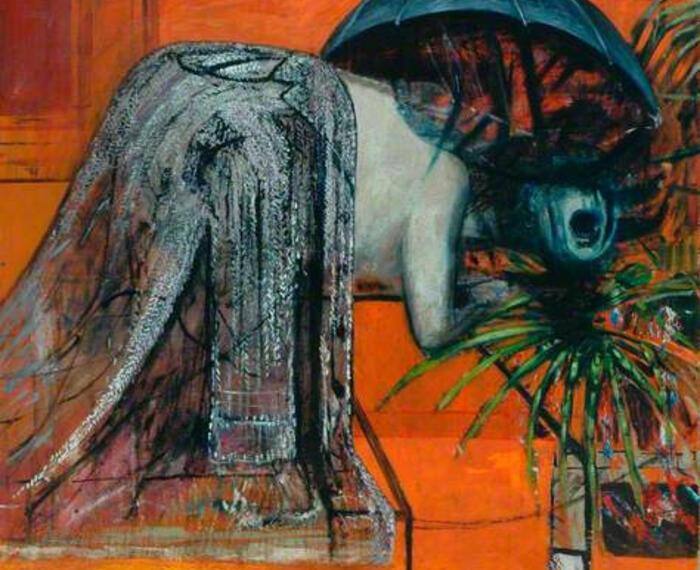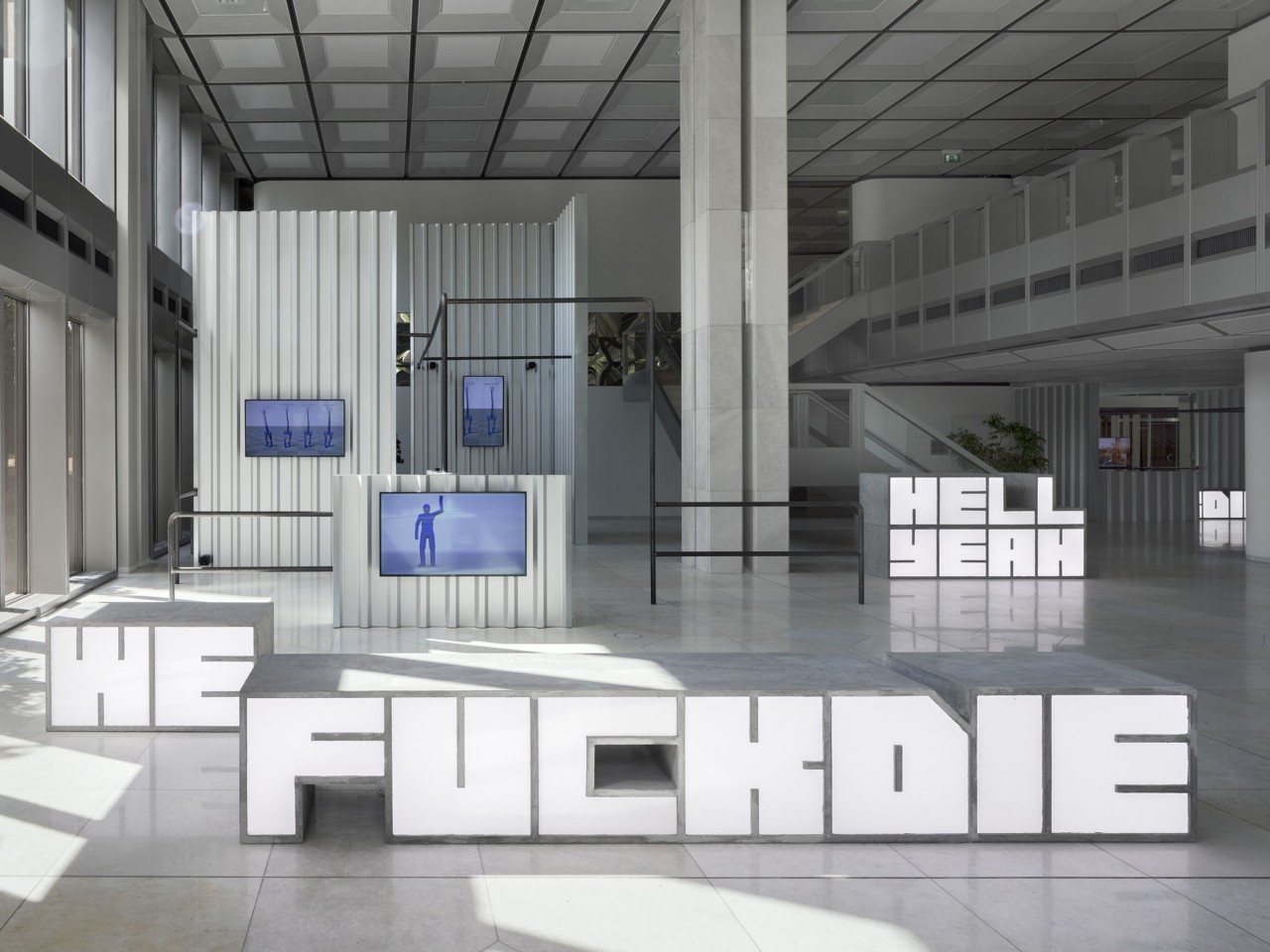


Hito Steyerl, HellYeahWeFuckDie, © Skulptur Projekte 2017, Foto/photo: Henning Rogge
Pack some sunscreen and an anorak, for Germany’s summer weather seems to be as unpredictable as ours at the moment, and explore Skulptur Projekte Münster (SPM) by hire bike. This is the most enjoyable way to see the works in this year’s edition of the decennial public sculpture exhibition that completes a grand tour of Athens-Venice-Kassel-Münster for the truly committed art lover. This lively university town has bike lanes and respectful motorists that London can only dream of.
The sculptures in this edition cluster around several themes, although these are not made explicit in the curatorial statement. One is the post-apocalyptic, epitomised by Pierre Huyghe’s living installation After ALife Ahead in a former ice rink. In it he has created a biotope by digging through the floor to turn up Ice Age sand and form a sci-fi landscape that allows plants and insects to multiply undisturbed. Out of view, cancer cells reproduce in an incubator and subtly influence the environment through opening and closing the skylights. Alongside a hive of Huyghe’s signature bees, a pair of chimera peacocks initially inhabited the space but had to be removed after they became ill. The installation’s primordial aura suggests our presence on the earth is fleeting and probes our relationship to our planet and our fellow animals.
Aram Bartholl playfully mocks our digital addiction with his devices that transform fire, our earliest technology, into electrical energy. At a campfire, visitors are invited to charge their phones via a stick-mounted generator held in the flames. This absurd process prompts questions of how we would cope without electricity and the internet. How would we remember anything without our phones and social media? It’s a sobering thought.
Another leitmotif was parallel universes. Mika Rottenberg’s playful film Cosmic Generator (working title) imagines a version of the tunnel rumoured to exist between the American and Mexican halves of a border town, Calexico/ Mexicali, via a portal in a Chinese restaurant. Installed in the back of a Chinese supermarket, Rottenberg’s film transports us to a not-so-distant world where bored female workers sit enshrined by colourful plastic products and flashing LED lights in an enormous market. This absorbing work sparks contemplation on the toll alienated labour takes on the mind and body. It also reminds us that every wall implies a tunnel, the two sides of a desire for, and fear of, proximity which feels very pertinent in today’s political climate. Another alternative reality unfolds in Ayşe Erkmen’s Instagram-hit On Water (Auf dem Wasser), which offered visitors the chance to ‘walk on water’ in the old harbour, where industrial activity has been superseded by bars and eateries. This is refreshing to participate in and most effective to watch from the shore.
Works addressing our relationship to the past are also prominent. My highlight of SPM is Alexandra Pirici’s Leaking Territories in the Rathaus, the historic town hall. Her group of six international performers form a collective body interpreting significant moments in history with their bodies and positioning these events in time and space in relation to where we are standing at that moment. That is, in the woodpanelled hall where the Treaty of Münster was signed in 1648, ending a series of devastating European wars and establishing a precedent for peace negotiations by diplomatic congress. The performers enact monuments and photographs associated with key events in our collective memory, from the clearing of the Warsaw Ghetto to the Martyr’s Monument in Algiers. An interior logic emerges that relates the local to the global and reflects the internet searches we carry out innumerable times per day using key words.
The festival, in its fifth edition, is once again headed by founder Kasper König, with curators Marianne Wagner and Britta Peters. The festival’s stance is anti-market and feels very different to the Venice Biennale in that respect. Many of the works are ephemeral or will only be appreciated by citizens of Münster, having been woven into its urban fabric. Video works by Andreas Bunte Laboratory Life that dissect everyday activities for example, downloadable via QR codes on posters around the city, or the high-energy, multilingual evening performances by Gintersdorfer/Klassen. Meanwhile Cerith Wyn Evans has cooled the bells in St Stephen’s Church so that their sound is subtly altered, a change that only locals would be aware of. At the request of Jeremy Deller, a group of allotment gardeners have been keeping personal gardening diaries for the last ten years and these are now on display in a garden shed in handsome green leather-bound volumes.
Emeka Ogboh, also part of Documenta this year, gets under the skin of the city. He has installed a sound work in a busy underpass near Münster’s main station, frequented by buskers; it is inspired by the late blind musician Moondog, aka the Viking on Fifth Avenue, who is buried in the city. He has also created Quiet Storm, a special beer using local ingredients and the city’s ‘good vibes’ available in local bars. Its label describes it as ’a honey ale with lime tree flowers fermented to Lagos soundscapes, honey collected in the city of Münster’.
One of several works addressing the situation of refugees in Germany is Lara Favaretto’s Momentary Monument – The Stone, a pair of hollowed out granite boulders with slits cut into them to receive monetary donations. At the end of the exhibition they will be destroyed and the money given to a charity helping people facing deportation. One is in Münster, the other in Marl, a nearby town hosting some SPM projects this year. The town is well worth the trip if you have time, as it is built in bold Brutalist Ruhr Moderne style, in contrast to Münster, which was rebuilt as a simulacrum of its pre-Second World War appearance. If you want to make a long weekend of it, as well as the 36 new projects to explore in Münster, there are 38 projects left from previous editions which you can track down. Happy cycling!
Ali MacGilp
Programmes Manager
Skulptur Projekte Münster continues until Sunday 1 October 2017 at venues across the city. www.skulptur-projekte.de